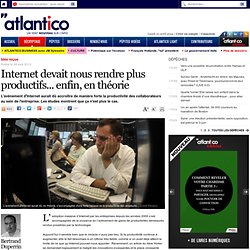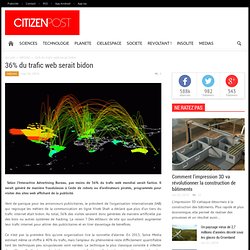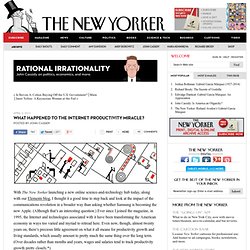

Internet devait nous rendre plus productifs... enfin, en théorie. L’adoption massive d’Internet par les entreprises depuis les années 2000 s’est accompagnée de la croyance en l’avènement de gains de productivités démesurés rendus possibles par la technologie.

Aujourd’hui il semble bien que le miracle n’aura pas lieu. Si la productivité continue à augmenter, elle le fait désormais à un rythme très faible, comme si on avait déjà atteint la limite de ce que qu’Internet pouvait nous apporter. Récemment, un article du New Yorker se demandait logiquement si malgré les innovations incessantes et le place croissante d’Internet nous n’étions pas à l’orée d’une longue période de stagnation. Depuis sa généralisation dans l’entreprise, Internet et ses outils ont principalement servi a améliorer l’existant. A faire plus vite ce qu’on faisait avant, en s’affranchissant de certaines contraintes mais sans vraiment remettre en cause la manière dont on faisait les choses. Dans ce sens, Internet est soumis aux mêmes règles que n’importe quelle technologie.
Humanrithm: Saving the Web from Chaos. Scroungers & opportunists... Crap. The Content Marketing Deluge. Spams & scams. Extremely redundant sectors & topics. 撥亂反正. Point de Contact. How Covert Agents Infiltrate the Internet to Manipulate, Deceive, and Destroy Reputations. One of the many pressing stories that remains to be told from the Snowden archive is how western intelligence agencies are attempting to manipulate and control online discourse with extreme tactics of deception and reputation-destruction.

It’s time to tell a chunk of that story, complete with the relevant documents. Over the last several weeks, I worked with NBC News to publish a series of articles about “dirty trick” tactics used by GCHQ’s previously secret unit, JTRIG (Joint Threat Research Intelligence Group). These were based on four classified GCHQ documents presented to the NSA and the other three partners in the English-speaking “Five Eyes” alliance. Today, we at the Intercept are publishing another new JTRIG document, in full, entitled “The Art of Deception: Training for Online Covert Operations.” Other tactics aimed at individuals are listed here, under the revealing title “discredit a target”: 36% du trafic web serait bidon. Selon l’Interactive Advertising Bureau, pas moins de 36% du trafic web mondial serait factice.

Il serait généré de manière frauduleuse à l’aide de robots ou d’ordinateurs piratés, programmés pour visiter des sites web affichant de la publicité. Vent de panique pour les annonceurs publicitaires, le président de l’organisation internationale (IAB) qui regroupe les métiers de la communication en ligne Vivek Shah a déclaré que plus d’un tiers du trafic internet était bidon.
Au total, 36% des visites seraient donc générées de manière artificielle par des bots ou autres systèmes de hacking. La raison ? Des éditeurs de site qui souhaitent augmenter leur trafic internet pour attirer des publicitaires et en tirer davantage de bénéfices. Ce n’est pas la première fois qu’une organisation tire la sonnette d’alarme. Et certains grands médias ne seraient pas en reste ! Internet-signalement.gouv.fr - Portail officiel de signalements de contenus illicites - Accueil. Hoax & Urban Legends.
About. 2013 Link Rot Report.doc.pdf. What Happened to the Internet Productivity Miracle? With The New Yorker launching a new online science-and-technology hub today, along with our Elements blog, I thought it a good time to step back and look at the impact of the communications revolution in a broader way than asking whether Samsung is becoming the new Apple.

(Although that’s an interesting question.) Ever since I joined the magazine, in 1995, the Internet and technologies associated with it have been transforming the American economy in ways too varied and myriad to retread here. Even now, though, almost twenty years on, there’s precious little agreement on what it all means for productivity growth and living standards, which usually amount to pretty much the same thing over the long term. (Over decades rather than months and years, wages and salaries tend to track productivity growth pretty closely.*) Creating A Meaningful Internet.